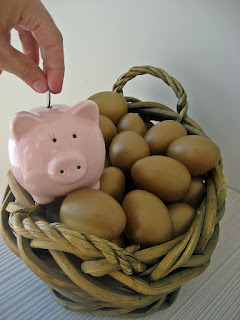#59 Home Ownership & Self Sufficiency
It is very tempting to say “independence,”
but let’s be honest. We all depend at least in part on ˆsomething or someone”
in our lives – regardless of stage or status!
Self-sufficiency is a bit more realistic; and, unlike independence, having
the goal of a life that is relatively self-sufficient, in major aspects and
function, is a goal that’s quite attainable.
Setting the goal to buy a
home of your own takes you a giant step toward self-sufficiency! And, achieving
that goal brings a lot of perks and privileges.
Let’s just start with all the things you can’t do while living in rental
property! That can be a pretty substantial
list. Landlords, of course, have the
right to call the shots (it’s their property, after all); it amounts to living
with rules and restrictions with which you might not agree! Most of those handicaps disappear when you
own your own home.
The most obvious change is
that you now have control of the place where you live, and how you wish to live
there. Except for compliances having to
do with local laws, ordinances, building codes, permits and neighborhood
considerations, you can relax into your preferred lifestyle. Everything from pets to security are choices
and decisions that you get to make. However, some of your choices are possible
and permissible only as long as they meet the required disciplines, standards
and conformity decided by the community decision makers
Do you want to convert to solar
power, plant a vegetable garden, and install fencing or a swimming pool? Maybe you have lived in rentals where pets were
prohibited or limited and involved paying large security deposits against
damage or injury. Now you will be able
to have the animals you want on your own property. There are some disciplines involved, of
course, in consideration of neighbors.
The number of, or the kind of, animals might involve compliance with
ordinances addressing sound, odor and the safety of neighbors. “Farm animals” such as chickens might not be
permitted in some closely built neighborhoods.
Those amenities are all matters you get to decide, develop and add to
your responsibilities.
Another possibility is
perhaps renting a room in your house as a way to help meet your monthly
Mortgage loan payment. If so, you then
become the landlord who must establish the guidelines, rules and disciplines
for the renter sharing your personal property.
Earlier in the process, when
you and your residential Realtor were searching for your house, you were
probably advised to learn about specific locations and any restrictions such
areas might have, for instance, concerning the kinds of animals permitted, the
number of dogs (or chickens!) that would be allowed, etc.! Even the construction of fencing will, no
doubt, have some specifications to consider.
Your residential Realtor can help you – even after the fact of your home
purchase – to clarify, interpret and further advise concerning special
circumstances with your new neighborhood and community. So, don’t hesitate to ask; if they don’t have
the answers, they will know who does!
It is easy to see the subtle
nuances in the concepts of independence and self-sufficiency! Even
when you do acquire ownership and control over your living space and property
by purchasing a home of your own, there will still be factors with which to
comply, cooperate and compromise.
Because we are an organized society of communities, we do have control
of our own property – but only as long as it doesn’t infringe on the same
privileges of others.
That’s where another form of
your new control comes in: As a homeowner, you will have the opportunity to
participate with the decision makers in your community that determine those
laws, rules, ordinances, etc., with which all must comply and factor into their
individual scope of personal control.
It’s smart to be involved!




Comments
Post a Comment